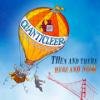
Twenty-nine awards and 129 festival showings since Gay Chorus Deep South opened at New York’s Tribeca Film Festival in April, the documentary returns to San Francisco for what is certain to be a sold-out run at the Roxie Theater on 16th Street, Nov. 22–27. The heartwarming full-length documentary, which covers the historic bus tour that, in the fall of 2017, over 300 members of the San Francisco Gay Men’s Chorus and members of the Oakland Interfaith Gospel Choir undertook to the Deep South (as in Mississippi, Tennessee, through the Carolinas, and over the historic bridge in Selma), originally aired in San Francisco at the LGBTQ Film Festival this past June.
Produced by San Francisco’s Bud Johnson and directed/co-written by independent filmmaker David Charles Rodrigues, the film came about when Rodrigues learned of Gay Chorus Conductor Tim Seelig’s plans for the tour. As Rodrigues explained in a three-way phone conversation with Seelig, once he learned of the SFGMC’s audacious plans, he approached Airbnb, with whom he had worked previously on advertising footage, and proposed financing.

“They really support the LGBTQ community and the chorus and, most importantly, the message of belonging that this film has at its heart,” Rodrigues said. “Our producer Bud is also an Airbnb employee. MTV Documentary Films has since acquired the film and plans to release it to a larger audience.
“We approached the chorus around January/February 2017 and started shooting in May. Tim and others were not only subjects of the film but also collaborators. We worked closely, like one big family. If it wasn’t for that, we never would have been able to achieve what we achieved.”
The film mixes pre-tour visits by Seelig and others to potential sites for the SFGMC’s unprecedented 25 appearances in five states in eight days with performance footage and behind the scene vignettes. The music ranges from the sacred — an arrangement of “Amazing Grace” with deep resonance for chorus members who fled Southern churches, parental condemnation, and more — to a hilarious performance by a chorus member in drag. Along the way, we spend extended time with Jimmy White, a chorus member who heals his relationship with his father while he sings up a storm and undergoes ongoing chemotherapy treatment for cancer, and Ashlé, a gender fluid chorus member who shares his journey and internal questioning with us. There are also a few shots of protestors and chats with church members/pastors of the welcoming and less-than sort and revealing interviews with concert attendees of all ages, gender identities, and beliefs.
The singing is exceptional, both from the SFGMC and a number of its genuinely superb soloists, and from the ever-inspiring Oakland Interfaith Gospel Chorus. Given one of the premises of the tour — the way to reach people down South is through the church, because the South is so deeply rooted in the church — parts of the film may be a bit off-putting for those allergic to Christianity, Southern style. Others may find the frequent focus on the visionary Seelig, who from my experience with SFGMC tends to put himself in the center of things, a bit excessive. Then again, as the former associate minister of music of the First Baptist Church of Houston, Texas — one who had a “beautiful wife and two beautiful kids” when he came out — this is very much Seelig’s story.
“The chorus has two twin children, music and mission, that we’ve worked on for 41 years,” Seelig said. “Going to the South was a huge opportunity to highlight both of our children. As a non-profit, we weren’t even thinking about a documentary. We were thinking, everyone bring your iPhone and we’ll put the video all together in the end. This opportunity for the SFGMC to have our music and message heard around the world is beyond our imagination. We are so grateful for the experience and for the ability to get our message of hope out there.”

SFGMC dubbed its journey the Lavender Pen Tour. “We said that we were going to the two states with the worst laws, and with Harvey Milk as our patron saint,” Seelig explained. “Our first performance was at the candlelight vigil following his assassination — so we figuratively took the lavender pen that Harvey gave Mayor George Moscone, turned it into a baton, and have been waving it ever since. As Harvey said, ‘You’ve got to give ’em hope.’”
One piece the chorus sings on the tour, Holly Near’s “Singing for Our Lives,” has special resonance. It seems that after the assassination, when the chorus performed at City Hall at the request of Acting Mayor Dianne Feinstein, they initially intended to sing the one song they’d been practicing, Mendelssohn’s “Oh Lord, Our Refuge.” Near, who wrote her song on the way to the vigil, got up on the stage and taught it to the chorus so that they and 10,000 vigil attendees could sing along. Years later, I was in tears when, at the historic Gay March on Washington, Near led a far bigger crowd in the song.
You, too, may be in tears when you see this film. As an uplifting addendum to the ongoing impeachment hearings, which seem to get juicier with each passing day, it’s just what the doctor ordered and the country needs.




